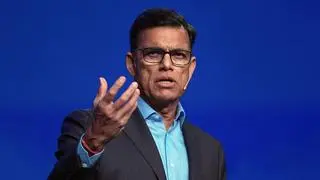It’s 8 a.m. and the morning traffic is already surging and swirling around Aavin circle, a leafy and prominent roundabout in Adyar, Chennai. School and office goers are battling for space on two-wheelers and cars in between rumbling buses. I quickly slip into the air-conditioned part of Ratna Café, just off the circle, and one of the city’s iconic vegetarian restaurants, glad to be away from the noise and bustle.
I am meeting Krish Subramanian, the 42-year-old co-founder and CEO of Chargebee,a 11-year-old SaaS product company with 5,000-plus global customers, across 60 countries, and a handful in India.
The subscription billing and revenue management platform exploded into the Unicorn space in April of 2021. It is now valued at $ 3.5 billion after a last fund raise earlier this year in February of $ 250 million from Tiger Global, Sequoia Capital and by investors such as Insight Partners, Sapphire and Steadview Capital. Altogether, Chargebee has raised $ 475 million in funding over the years.
Krish is already there; in a Chargebee T-shirt and jeans, he carries his CEO title lightly. The restaurant is yet to fill up and we order quickly. I order the usual idli-vada combine while Krish orders idlis to start with. They’re dunked in Ratna Café’s extraordinarily tasty sambar, which has acquired quite a reputation. The restaurant has nailed on the wall a framed article from The Hindu, titled ‘Where the sambar is Super star’! Various chutneys from coconut to tomato are placed alongside.
We begin eating and I ask Krish if he always wanted to be an entrepreneur from the time he finished college. “Not initially, the bug bit me later. I had plans to start off on my own from my days in TCS but it was a question of when,” says Krish.
It certainly didn’t look like that when he and Rajaraman Santhanam, a Chargebee co-founder, finished their computer science engineering degree in 2001 from AVC College of Engineering in Mayiladuthurai, deep south in Tamil Nadu.
Krish couldn’t get a job for six months as the job market was in the doldrums. IT firms were reneging on their job offers. Krish pottered around, working for a professor who managed a few projects.
The prof didn’t pay him anything but it was fine with Krish, as “it was hard to be at home thinking I was not going to get a job, and I also got access to a computer,” he recalls. “Jobs in BPOs were the only ones available. I didn’t want to get into a BPO as it wouldn’t lead me to a developer’s job, which I wanted to be,” he says.
Early ambitions
A short stint in a Bengaluru start-up followed before Krish was back in Chennai after a few months. He was picked up by TCS in an off campus placement at a significantly higher salary. “I was looking for technical mentoring and exposure and thought TCS would do me good. I got lucky as I got thrown into this project and worked in product implementation in a TCS-HP venture,” recalls Krish. The job took him to the US as well for three-and-a-half years where he worked in Cummins which was a TCS client.
“By the time I came back to India with TCS in 2009, we (with his college mate Rajaraman) were talking about building a product company,” says Krish.
Another short stint with Cognizant followed, before Krish made a decisive move by quitting the company in 2011 with the idea of starting up. Rajaraman was working with Zoho at that time, where both KP Saravanan and T Thiyagarajan, who would later be co-founders, also worked. They found an unlikely inspiration on starting up – a blog.
“We came across this blog by Joel Spolsky, he was an active blogger with his ‘Joel–on-Software.com’ blog. He used to be in Microsoft and was building his own product company. He talked about the journey of building a software company and said developers should think about building a company. He had a lot of ideas and that became a common connect for us co-founders to discuss,” he explains.
The other three co-founders had also quit their jobs by then and threw in their lot in the start-up. Rajaraman’s and Thiyagu’s apartment in Velachery, a suburb, was the office; beyond a curtain was their living space.
“We didn’t want to build a services company, but a product company, that was the core idea,” recalls Krish. Meanwhile, interesting things were happening around the world which Krish hungrily followed. Spolsky’s company, FogCreekSoftware, Basecamp, which started in 2006 in Chicago, was writing blogs about the kind of product company they wanted to build.
“We were constantly learning from these companies which had their learnings out in public. SaaS was going to take off and they were sharing what they knew about how to build a SaaS product. We started following SaaS from 2005 onwards and got ready for the SaaS world” says Krish.
The four co-founders were ambitious. “It was never about a particular problem, it was about solving a problem through a product and building a great organisation that cared about building great products,” says Krish.
It was a time too when many direct-to-consumer firms world over were emerging which involved subscriptions, across multiple plans, multiple countries and currencies. On the internet they could see that there were many pain points being talked about: subscriptions expiring, people don’t renew, but still the product was going to them or consumers wanted to change their plans et al. Managing this for these firms became the core of what Chargebee embarked on.
“We looked at the intersection of payments and looked at problems from the enterprise side for SMBs. We could see that the product we developed was scalable and repeatable,” says Krish. But, as engineers, their obsession was in developing a snag-free product.
“We didn’t really study the market size or even have a go-to-market strategy. Our aspiration was not in building a million dollar company but something which could pay us ₹1 lakh in salary every month and how soon we could do it and if we could survive that long,” says Krish, laughing at the extent of their ambitions then.
We had long polished off our idli-vadas, so we ask for crisp dosas; Krish goes for a podi dosa while I settle for a plain. The delectable sambar is back again. And, with more in the restaurant the noise level is steadily building up too.
Frugal living
The initial years, Krish says, were hard. It took almost 15 months for the first version of the product. As a boot-strapped company, they were all living frugally. Krish recalls they raised some capital from all their classmates to keep going.
“I was getting worried that I would run out of money, my son was getting ready for school, the other three were bachelors then, happily coding away. I was telling my wife that I was really worried that they are working with a different level of urgency and I wanted to talk to them about me taking a six month break and go and work somewhere and come back when the product is ready,” recalls Krish. But, stay the course he did: he was in the office the next day by 7 a.m.
“I just put a constraint on my partners that we are going to launch on this particular day. My consulting background helped in building an order pipeline. I was seeing blogs on subscription management woes; somebody would say their billing system is broken, I would suggest step methods on how to solve it themselves. By the time the product was ready for launch, we had lined up 300 customers worldwide, through Skype calls, for our subscription billing software. We had tied up with small and medium businesses around the world, who were prepared to be beta customers. The pain was acute for them and they were willing to try out new solutions,” he explains.
The first five years was all about figuring out their growth path, the right product fit and the pricing. Freshworks was on board as a customer and Girish Mathrabootham also invested in the first angel round of funding.
“Once we found the right product fit we moved from $1 million to $5 million revenues very fast. The momentum built up and then revenue kept doubling. We serve small customers and grow with them. We grew with Freshworks from one product and few hundred customers to 13 products and over 50,000 customers,” he emphasises.
Accel Partners too, in 2013, had invested by then, $800,000 in the first round of funding. Today, among the top customers are Deliverr, which was recently acquired by Shopify for $2.1 billion; Study.com, Freshworks, Sendinblue, Zenchef, TokyoTreat, Calendly, among others.
From 300 people three years ago, Chargebee now employs 1,200, with 83 per cent of them in India, 200-plus in the US and the rest in Europe and five in Australia. Krish himself is based in Amsterdam so that he could optimise the time zone difference between the US and India, given that most of the clients are in the US and Europe.
The company does not have an office in Chennai now; it gave it up during the Covid years and all staffers WFH. The company has CXOs in three different countries as well, while the chief revenue officer is based in San Diego and the chief product officer in California.
In the past year, Chargebee also acquired three small companies whose products help it expand its offerings as a revenue management platform for subscription businesses. “There is no urgency for an IPO but we will be open to this idea in the next three to five years,” he adds.
As we wind up the conversation with a strong coffee, I ask him if being a millionaire now has changed anything in his life. “Semma (very) grateful,” he says with a huge smile, “We got lucky. And, also grateful that we were able to transform the journey for many people and ensure their financial freedom.” But, as he says, it shouldn’t change things for him and the founding team. They’re all still charged up with energy to grow faster and keep up the excitement of a young start-up.








Comments
Comments have to be in English, and in full sentences. They cannot be abusive or personal. Please abide by our community guidelines for posting your comments.
We have migrated to a new commenting platform. If you are already a registered user of TheHindu Businessline and logged in, you may continue to engage with our articles. If you do not have an account please register and login to post comments. Users can access their older comments by logging into their accounts on Vuukle.